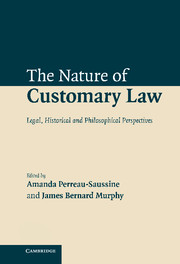Book contents
- Frontmatter
- Contents
- List of contributors
- Table of cases
- The character of customary law: an introduction
- Part I Custom and morality: natural law, customary law and ius gentium
- Part 2 Custom and law: custom, common law and customary international law
- 7 Custom in medieval law
- 8 Siege warfare in the Early Modern Age: a study on the customary laws of war
- 9 The idea of common law as custom
- 10 Three ways of writing a treatise on public international law: textbooks and the nature of customary international law
- 11 Custom, common law reasoning and the law of nations in the nineteenth century
- 12 Custom in international law: a normative practice account
- 13 Customary international law and the quest for global justice
- Index of names
11 - Custom, common law reasoning and the law of nations in the nineteenth century
Published online by Cambridge University Press: 30 June 2009
- Frontmatter
- Contents
- List of contributors
- Table of cases
- The character of customary law: an introduction
- Part I Custom and morality: natural law, customary law and ius gentium
- Part 2 Custom and law: custom, common law and customary international law
- 7 Custom in medieval law
- 8 Siege warfare in the Early Modern Age: a study on the customary laws of war
- 9 The idea of common law as custom
- 10 Three ways of writing a treatise on public international law: textbooks and the nature of customary international law
- 11 Custom, common law reasoning and the law of nations in the nineteenth century
- 12 Custom in international law: a normative practice account
- 13 Customary international law and the quest for global justice
- Index of names
Summary
The common law has long been explained as a customary system of law, rooted in consent, whose rules are both consonant to reason and flexible, allowing the law to develop in accordance with the ‘felt necessities’ of the community. As such, it seems to have much in common with a law of nations founded on the consent of nations as well as reason, manifested in part by developing customary practices in the international community. Indeed, lawyers have gone so far as to state simply that the law of nations is part of the common law. In the words of Lord Denning:
Seeing that the rules of international law have changed – and do change – and that the courts have given effect to the changes without any Act of Parliament, it follows to my mind inexorably that the rules of international law, as existing from time to time, do form part of our English law.
Yet such a view has not been universally subscribed to. Many judges have taken a narrower approach, requiring norms of international law to be positively incorporated before they bind at common law. Nourse LJ, for instance, felt that established rules ‘derived from one or more of the recognised sources of international law’ are binding only when they have ‘been carried into English law by statute, judicial decision or ancient custom’.
- Type
- Chapter
- Information
- The Nature of Customary LawLegal, Historical and Philosophical Perspectives, pp. 256 - 278Publisher: Cambridge University PressPrint publication year: 2007
- 3
- Cited by



